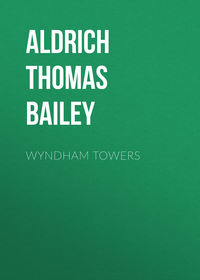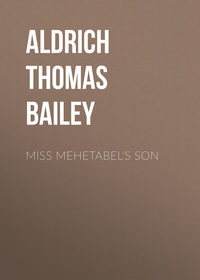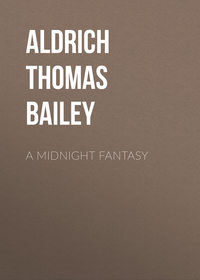 полная версия
полная версияThe Queen of Sheba, and My Cousin the Colonel
I began bitterly to regret that I had been obliged to present my cousin to her so abruptly. I wished it had occurred to me to give him a word or two of caution, or that I had had sense enough to adhere to my first plan of letting him feed himself at the little oyster establishment round the corner. But wishes and regrets could not now mend the matter; so I hailed an approaching horse-car, and comforted myself on the rear platform with the reflection that perhaps the colonel would not wave the palmetto leaf too vigorously, if he waved it at all, in the face of Mrs. Wesley.
II
The awkwardness of the situation disturbed me more or less during the forenoon; but fortunately it was a half-holiday, and I was able to leave the office shortly after one o'clock.
I do not know how I came to work myself into such a state of mind on the way up town, but as I stepped from the horse-car and turned into Clinton Place I had a strong apprehension that I should find some unpleasant change in the facial aspect of the little red brick building I occupied—a scowl, for instance, on the brown-stone eyebrow over the front door. I actually had a feeling of relief when I saw that the facade presented its usual unaggressive appearance.
As I entered the hall, Mrs. Wesley, who had heard my pass-key grating in the lock, was coming down-stairs.
"Is my cousin here, Clara?" I asked, in the act of reaching up to hang my hat on the rack.
"No," said Mrs. Wesley. There was a tone in that monosyllable that struck me. "But he has been here?"
"He has been here," replied Mrs. Wesley. "May be you noticed the bell-knob hanging out one or two inches. Is Mr. Flagg in the habit of stretching the bell-wire of the houses he visits, when the door is not opened in a moment? Has he escaped from somewhere?"
"Escaped from somewhere!" I echoed. "I only asked; he behaved so strangely."
"Good heavens, Clara! what has the man done? I hope that nothing unpleasant has happened. Flagg is my only surviving relative—I may say our only surviving relative—and I should be pained to have any misunderstanding. I want you to like him."
"There was a slight misunderstanding at first," said Clara, and a smile flitted across her face, softening the features which had worn an air of unusual seriousness and preoccupation. "But it is all right now, dear. He has eaten everything in the house—that bit of spring lamb I saved expressly for you!—and has gone down town 'on a raid,' as he called it, in your second-best suit—the checked tweed. I did all I could for him."
"My dear, something has ruffled you. What is it?"
"Wesley," said my wife slowly, and in a perplexed way, "I have had so few relatives that perhaps I don't know what to do with them, or what to say to them."
"You always say and do what is just right."
"I began unfortunately with Mr. Flagg, then. Mary was washing the dishes when he rang, and I went to the door. If he IS our cousin, I must say that he cut a remarkable figure on the doorstep."
"I can imagine it, my dear, coming upon you so unexpectedly. There were peculiarities in his costume."
"For an instant," Clara went on, "I took him for the ashman, though the ashman always goes to the area door, and never comes on Tuesdays; and then, before the creature had a chance to speak, I said, 'We don't want any,' supposing he had something to sell. Instead of going away quietly, as I expected he would do, the man made a motion to come in, and I slammed the door on him."
"Dear! dear!"
"What else could I do, all alone in the hall? How was I to know that he was one of the family?"
"What happened next?"
"Well, I saw that I had shut the lapel of his coat in the door-jamb, and that the man couldn't go away if he wanted to ever so much. Wasn't it dreadful? Of course I didn't dare to open the door, and there he was! He began pounding on the panels and ringing the bell in a manner to curdle one's blood. He rang the bell at least a hundred times in succession. I stood there with my hand on the bolt, not daring to move or breathe. I called to Mary to put on her things, steal out the lower way, and bring the police. Suddenly everything was still outside, and presently I saw a piece of paper slowly slipping in over the threshold, oh, so slyly! I felt my hands and feet grow cold. I felt that the man himself was about to follow that narrow strip of paper; that he was bound to get in that way, or through the keyhole, or somehow. Then I recognized your handwriting. My first thought was that you had been killed in some horrible accident"—
"And had dropped you a line?"
"I didn't reason about it, Wesley; I was paralyzed. I picked up the paper, and read it, and opened the door, and Mr. Flagg rushed in as if he had been shot out of something. 'Don't want any?' he shouted. 'But I do! I want some breakfast!' You should have heard him."
"He stated a fact, at any rate. To be sure he might have stated it less vivaciously." I was beginning to be amused.
"After that he was quieter, and tried to make himself agreeable, and we laughed a little together over my mistake—that is, HE laughed. Of course I got breakfast for him—and such a breakfast!"
"He had been without anything to eat since yesterday."
"I should have imagined," said Clara, "that he had eaten nothing since the war broke out."
"Did he say anything in particular about himself?" I asked, with a recurrent touch of anxiety.
"He wasn't particular what he said about himself. Without in the least seeing the horror of it, he positively boasted of having been in the rebel army."
"Yes—a colonel."
"That makes it all the worse," replied Clara.
"But they had to have colonels, you know."
"Is Mr. Flagg a Virginian, or a Mississippian, or a Georgian?"
"No, my dear; he was born in the State of Maine; but he has lived so long in the South that he's quite one of them for the present. We must make allowances for him, Clara. Did he say anything else?"
"Oh, yes."
"What did he say?"
"He said he'd come back to supper."
It was clear that Clara was not favorably impressed by my cousin, and, indeed, the circumstances attending his advent were not happy. It was likewise clear that I had him on my hands, temporarily at least. I almost reproach myself even now for saying "on my hands," in connection with my own flesh and blood. The responsibility did not so define itself at the time. It took the form of a novel and pleasing duty. Here was my only kinsman, in a strange city, without friends, money, or hopeful outlook. My course lay before me as straight as a turnpike. I had a great deal of family pride, even if I did not have any family to speak of, and I was resolved that what little I had should not perish for want of proper sustenance.
Shortly before six o'clock Washington Flagg again presented himself at our doorstep, and obtained admission to the house with fewer difficulties than he had encountered earlier in the day.
I do not think I ever saw a man in destitute circumstances so entirely cheerful as my cousin was. Neither the immediate past, which must have been full of hardships, nor the immediate future, which was not lavish of its promises, seemed to give him any but a momentary and impersonal concern. At the supper-table he talked much and well, exceedingly well, I thought, except when he touched on the war, which he was continually doing, and then I was on tenter-hooks. His point of view was so opposed to ours as to threaten in several instances to bring on an engagement all along the line. This calamity was averted by my passing something to him at the critical moment. Now I checked his advance by a slice of cold tongue, and now I turned his flank with another cup of tea; but I questioned my ability to preserve peace throughout the evening. Before the meal was at an end there had crept into Clara's manner a polite calmness which I never liked to see. What was I going to do with these two after supper, when my cousin Flagg, with his mind undistracted by relays of cream toast, could give his entire attention to the Lost Cause?
As we were pushing the chairs back from the table, I was inspired with the idea of taking our guest off to a cafe concert over in the Bowery—a volksgarten very popular in those days. While my whispered suggestion was meeting Clara's cordial approval, our friend Bleeker dropped in. So the colonel and Bleeker and I passed the evening with "lager-beer and Meyer-beer," as my lively kinsman put it; after which he spent the night on the sofa in our sitting-room, for we had no spare chamber to place at his disposal.
"I shall be very snug here," he said, smiling down my apologies. "I'm a 'possum for adapting myself to any odd hollow."
The next morning my cousin was early astir, possibly not having found that narrow springless lounge all a 'possum could wish, and joined us in discussing a plan which I had proposed overnight to Mrs. Wesley, namely, that he should hire an apartment in a quiet street near by, and take his meals—that was to say, his dinner—with us, until he could make such arrangements as would allow him to live more conveniently. To return South, where all the lines of his previous business connections were presumably broken, was at present out of the question.
"The war has ruined our people," said the colonel. "I will have to put up for a while with a place in a bank or an insurance office, or something in that small way. The world owes me a living, North or South."
His remark nettled me a little, though he was, of course, unaware of my relations with the Savonarola Fire Insurance Company, and had meant no slight.
"I don't quite see that," I observed.
"Don't see what?"
"How the world contrived to get so deeply into your debt—how all the points of the compass managed it."
"Thomas, I didn't ask to be born, did I?"
"Probably not."
"But I was born, wasn't I?"
"To all appearances."
"Well, then!"
"But you cannot hold the world in general responsible for your birth.
The responsibility narrows itself down to your parents."
"Then I am euchred. By one of those laws of nature which make this globe a sweet spot to live on, they were taken from me just when I needed them most—my mother in my infancy, and my father in my childhood."
"But your father left you something?"
"The old gentleman left me nothing, and I've been steadily increasing the legacy ever since."
"What did you do before the war?" inquired Clara sympathetically. His mention of his early losses had touched her.
"Oh, a number of things. I read law for a while. At one time I was interested in a large concern for the manufacture of patent metallic burial cases; but nobody seemed to die that year. Good health raged like an epidemic all over the South. Latterly I dabbled a little in stocks—and stocks dabbled in me."
"You were not successful, then?" I said.
"I was at first, but when the war fever broke out and the Southern heart was fired, everything that didn't go down went up."
"And you couldn't meet your obligations?"
"That wasn't the trouble—I couldn't get away from them," replied the colonel, with a winsome smile. "I met them at every corner."
The man had a fashion of turning his very misfortunes into pleasantries. Surely prosperity would be wasted on a person so gifted with optimism. I felt it to be kind and proper, however, to express the hope that he had reached the end of his adversity, and to assure him that I would do anything I could in the world to help him.
"Tom Wesley, I believe you would."
Before the close of that day Mrs. Wesley, who is a lady that does not allow any species of vegetation to accumulate under her feet, had secured a furnished room for our kinsman in a street branching off from Clinton Place, and at a moderate additional expense contracted to have him served with breakfast on the premises. Previous to this I had dined down town, returning home in the evening to a rather heavy tea, which was really my wife's dinner—Sheridan and Ulysses (such were the heroic names under which the two little Wesleys were staggering) had their principal meal at midday. It was, of course, not desirable that the colonel should share this meal with them and Mrs. Wesley in my absence. So we decided to have a six o'clock dinner; a temporary disarrangement of our domestic machinery, for my cousin Flagg would doubtless find some acceptable employment before long, and leave the household free to slip back into its regular grooves.
An outline of the physical aspects of the exotic kinsman who had so unexpectedly added himself to the figures at our happy fireside seems not out of place here. The portrait, being the result of many sittings, does not in some points convey the exact impression he made upon us in the earlier moments of our intimacy; but that is not important.
Though Washington Flagg had first opened his eyes on the banks of the Penobscot, he appeared to have been planned by nature to adorn the banks of the Rappahannock. There was nothing of the New Englander about him. The sallowness of his complexion and the blackness of his straight hair, which he wore long, were those of the typical Southerner. He was of medium height and loosely built, with a kind of elastic grace in his disjointedness. When he smiled he was positively handsome; in repose his features were nearly plain, the lips too indecisive, and the eyes lacking in lustre. A sparse tuft of beard at his chin—he was otherwise smoothly shaven—lengthened the face. There was, when he willed it, something very ingratiating in his manner—even Clara admitted that—a courteous and unconventional sort of ease. In all these surface characteristics he was a geographical anomaly. In the cast of his mind he was more Southern than the South, as a Northern convert is apt to be. Even his speech, like the dyer's arm, had taken tints from his environment. One might say that his pronunciation had literally been colored by his long association with the colored race. He invariably said flo' for floor, and djew for dew; but I do not anywhere attempt a phonetic reproduction of his dialect; in its finer qualities it was too elusive to be snared in a network of letters. In spite of his displacements, for my cousin had lived all over the South in his boyhood, he had contrived to pick up a very decent education. As to his other attributes, he shall be left to reveal them himself.
III
Mrs. Wesley kindly assumed the charge of establishing Washington Flagg in his headquarters, as he termed the snug hall bedroom in Macdougal Street. There were numberless details to be looked to. His wardrobe, among the rest, needed replenishing down to the most unconsidered button, for Flagg had dropped into our little world with as few impedimenta as if he had been a newly born infant. Though my condition, like that desired by Agur, the son of Jakeh, was one of neither poverty nor riches, greenbacks in those days were greenbacks. I mention the fact in order to say that my satisfaction in coming to the rescue of my kinsman would have been greatly lessened if it had involved no self-denial whatever.
The day following his installation I was partly annoyed, partly amused, to find that Flagg had purchased a rather expensive meerschaum pipe and a pound or two of Latakia tobacco.
"I cannot afford to smoke cigars," he explained. "I must economize until I get on my feet."
Perhaps it would have been wiser if I had personally attended to his expenditures, minor as well as major, but it did not seem practicable to leave him without a cent in his pocket. His pilgrimage down town that forenoon had apparently had no purpose beyond this purchase, though on the previous evening I had directed his notice to two or three commercial advertisements which impressed me as worth looking into. I hesitated to ask him if he had looked into them. A collateral feeling of delicacy prevented me from breathing a word to Clara about the pipe.
Our reconstructed household, with its unreconstructed member, now moved forward on the lines laid down. Punctually at a quarter to six P. M. my cousin appeared at the front door, hung his hat on the rack, and passed into the sitting-room, sometimes humming in the hall a bar or two of The Bonny Blue Flag that bears a Single Star, to the infinite distaste of Mrs. Wesley, who was usually at that moment giving the finishing touches to the dinner-table. After dinner, during which I was in a state of unrelaxed anxiety lest the colonel should get himself on too delicate ground, I took him into my small snuggery at the foot of the hall, where coffee was served to us, Mrs. Wesley being left to her own devices.
For several days matters went as smoothly as I could have hoped. I found it so easy, when desirable, to switch the colonel on to one of my carefully contrived side tracks that I began to be proud of my skill and to enjoy the exercise of it. But one evening, just as we were in the middle of the dessert, he suddenly broke out with, "We were conquered by mere brute force, you know!"
"That is very true," I replied. "It is brute force that tells in war. Wasn't it Napoleon who said that he had remarked that God was generally on the side which had the heaviest artillery?"
"The North had that, fast enough, and crushed a free people with it."
"A free people with four millions of slaves?" observed Mrs. Wesley quietly.
"Slavery was a patriarchal institution, my dear lady. But I reckon it is exploded now. The Emancipation Proclamation was a dastardly war measure."
"It did something more and better than free the blacks," said Mrs. Wesley; "it freed the whites. Dear me!" she added, glancing at Sheridan and Ulysses, who, in a brief reprieve from bed, were over in one corner of the room dissecting a small wooden camel, "I cannot be thankful enough that the children are too young to understand such sentiments."
The colonel, to my great relief, remained silent; but as soon as Clara had closed the dining-room door behind her, he said, "Tom Wesley, I reckon your wife doesn't wholly like me."
"She likes you immensely," I cried, inwardly begging to be forgiven.
"But she is a firm believer in the justice of the Northern cause."
"May be she lost a brother, or something."
"No; she never had a brother. If she had had one, he would have been killed in the first battle of the war. She sent me to the front to be killed, and I went willingly; but I wasn't good enough; the enemy wouldn't have me at any price after a year's trial. Mrs. Wesley feels very strongly on this subject, and I wish you would try, like a good fellow, not to bring the question up at dinner-time. I am squarely opposed to your views myself, but I don't mind what you say as she does. So talk to me as much as you want to, but don't talk in Clara's presence. When persons disagree as you two do, argument is useless. Besides, the whole thing has been settled on the battlefield, and it isn't worth while to fight it all over again on a table-cloth."
"I suppose it isn't," he assented good-naturedly. "But you people up at the North here don't suspicion what we have been through. You caught only the edge of the hurricane. The most of you, I take it, weren't in it at all."
"Our dearest were in it."
"Well, we got whipped, Wesley, I acknowledge it; but we deserved to win, if ever bravery deserved it."
"The South was brave, nobody contests that; but ''t is not enough to be brave'—
"'The angry valor dashedOn the awful shield of God,'as one of our poets says."
"Blast one of your poets! Our people were right, too."
"Come, now, Flagg, when you talk about your people, you ought to mean
Northerners, for you were born in the North."
"That was just the kind of luck that has followed me all my life. My body belongs to Bangor, Maine, and my soul to Charleston, South Carolina."
"You've got a problem there that ought to bother you."
"It does," said the colonel, with a laugh.
"Meanwhile, my dear boy, don't distress Mrs. Wesley with it. She is ready to be very fond of you, if you will let her. It would be altogether sad and shameful if a family so contracted as ours couldn't get along without internal dissensions."
My cousin instantly professed the greatest regard for Mrs. Wesley, and declared that both of us were good enough to be Southrons. He promised that in future he would take all the care he could not to run against her prejudices, which merely grew out of her confused conception of State rights and the right of self-government. Women never understood anything about political economy and government, anyhow.
Having accomplished thus much with the colonel, I turned my attention, on his departure, to smoothing Clara. I reminded her that nearly everybody North and South had kinsmen or friends in both armies. To be sure, it was unfortunate that we, having only one kinsman, should have had him on the wrong side. That was better than having no kinsman at all. (Clara was inclined to demur at this.) It had not been practicable for him to divide himself; if it had been, he would probably have done it, and the two halves would doubtless have arrayed themselves against each other. They would, in a manner, have been bound to do so. However, the war was over, we were victorious, and could afford to be magnanimous.
"But he doesn't seem to have discovered that the war is over," returned
Clara. "He 'still waves.'"
"It is likely that certain obstinate persons on both sides of Mason and Dixon's line will be a long time making the discovery. Some will never make it—so much the worse for them and the country."
Mrs. Wesley meditated and said nothing, but I saw that so far as she and the colonel were concerned the war was not over.
IV
This slight breeze cleared the atmosphere for the time being. My cousin Flagg took pains to avoid all but the most indirect allusions to the war, except when we were alone, and in several small ways endeavored—with not too dazzling success—to be agreeable to Clara. The transparency of the effort was perhaps the partial cause of its failure. And then, too, the nature of his little attentions was not always carefully considered on his part. For example, Mrs. Wesley could hardly be expected to lend herself with any grace at all to the proposal he made one sultry June evening to "knock her up" a mint-julep, "the most refreshing beverage on earth, madam, in hot weather, I can assure you." Judge Ashburton Todhunter, of Fauquier County, had taught him to prepare this pungent elixir from a private receipt for which the judge had once refused the sum of fifty dollars, offered to him by Colonel Stanley Bluegrass, of Chattanooga, and this was at a moment, too, when the judge had been losing very heavily at draw poker.
"All quiet along the Potomac," whispered the colonel, with a momentary pride in the pacific relations he had established between himself and Mrs. Wesley.
As the mint and one or two other necessary ingredients were lacking to our family stores, the idea of julep was dismissed as a vain dream, and its place supplied by iced Congress water, a liquid which my cousin characterized, in a hasty aside to me, as being a drink fit only for imbecile infants of a tender age.
Washington Flagg's frequent and familiar mention of governors, judges, colonels, and majors clearly indicated that he had moved in aristocratic latitudes in the South, and threw light on his disinclination to consider any of the humbler employments which might have been open to him. He had so far conceded to the exigency of the case as to inquire if there were a possible chance for him in the Savonarola Fire Insurance Company. He had learned of my secretaryship. There was no vacancy in the office, and if there had been, I would have taken no steps to fill it with my cousin. He knew nothing of the business. Besides, however deeply I had his interests at heart, I should have hesitated to risk my own situation by becoming sponsor for so unmanageable an element as he appeared to be.
At odd times in my snuggery after dinner Flagg glanced over the "wants" columns of the evening journal, but never found anything he wanted. He found many amusing advertisements that served him as pegs on which to hang witty comment, but nothing to be taken seriously. I ventured to suggest that he should advertise. He received the idea with little warmth.
"No, my dear boy, I can't join the long procession of scullions, cooks, butlers, valets, and bottle-washers which seem to make up so large a part of your population. I couldn't keep step with them. It is altogether impossible for me to conduct myself in this matter like a menial-of-all-work out of place. 'Wanted, a situation, by a respectable young person of temperate habits; understands the care of horses; is willing to go into the country and milk the cow with the crumpled horn.' No; many thanks."









